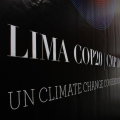China-US Agreement: White Knight or White Noise?
admin | December 12, 2014.
The two-decade history of the UN climate talks has been marked by a seemingly unsolvable stalemate amongst some of the largest carbon emitters. Despite abundant scientific proof of anthropogenic climate change, as well as an increase in climate change-related disasters, China and the United States have historically failed to fulfil the mandate of the talks to reduce greenhouse gases.
China and the US are the world’s two largest economies, and also its dirtiest polluters. Coupled with this, these states have long been considered the biggest hindrance to a global deal. Blame for the failure of the Copenhagen talks to produce a global treaty is often traced to Sino-American intransigence.
In a surprise twist, the lead up to the Lima conference has seen a shift in momentum, raising hopes for a multilateral agreement next year in Paris. Following the September climate summit in New York, the presidents of China and US announced an historic bilateral agreement for emissions reduction.
Despite detailing surprisingly impressive emissions targets, neither party laid a roadmap towards full decarbonisation of their economies. The announcement was welcomed with muted celebration by those in the climate world. As a developing nation, coal makes up over 70 per cent of China’s energy portfolio. The opening of hundreds of coal-burning power plants every year has contributed to the country’s successful economic growth, but the need for energy diversification has never been greater.
What the world can expect from China from this agreement is a slowing of emissions growth, plateauing around 2030. The terms laid out by the US are a reduction of emissions up to 28 per cent below 2005 levels, by 2025. The announcement of this came as a shock to the international community, as the negotiations were held in secret and announced on November 12 in Beijing.
China has historically lacked ambition for climate action even though it has agreed to slow down the rate of emissions in recent years. According to the UN, air quality in China is drastically below global standards, and the hope of a blue sky is limited. The Chinese themselves are beginning to see the need for change. As the cost of air pollution to the community—health, amenity, tourism, etc.—becomes clear, so too does pressure for drastic emissions cuts.
The US has also begun to feel the effects of climate change. There has been an awakening amongst Americans about the very real effects of the security risk at hand. Obama has been of the first US presidents to seriously address climate change, but like many of his other policies, he faces a political uncertainty with a hostile legislature.
“As the world’s two largest economies, energy consumers and emitters of greenhouse gases” Obama stated during the US-China announcement, “we have a special responsibility to lead the global effort against climate change”. Obama and his Chinese counterpart Xi Jinping, may be focused on climate change with regards to their own agendas, but the true potential of the deal is to open the floodgates to global action. The deal will only be a success if it prompts widespread movement towards a contemporary agreement on climate change action.
Directly following the announcement of the agreement in Beijing, both men attended the G20 summit being held in Brisbane, Australia. In contrast to past years, the agenda at this summit was drafted to avoid any mention of climate change at the request of Australia’s climate-skeptic Prime Minister Tony Abbott. Both Obama and members of the EU overrode this decision and opted to include climate change as a major topic of conversation during the meeting in Brisbane.
Abbott is an example of a world leader that has actively disengaged in the climate change dialogue. He is systematically dismantling Australian climate policy having withdrawn support for an emissions-trading scheme that had been effectively reducing carbon. The US-China climate deal dominating the G20 media coverage was a stark humiliation for Abbott, and contributed to mounting pressure on his regressive policy approach. Hopes were running high in the international climate community that the US-China would be a game-changer, spurring previous miscreant nations to ramp up climate policy.
The obvious first test of this was the Lima talks that have unfolded over the past fortnight. Speculation raged as to whether countries like India, Canada, Australia and the UK will begin to follow in the footsteps of China and the US. With the Lima talks a critical prelude to Paris next year, that impetus was badly needed.
And yet it failed to transpire. COP20 has been remarkable not for the extent of its progress but for the extent of failed expectations. Despite the US-China deal, the two behemoths have fallen back onto the traditional defensive positions, reproducing the grinding slowness of previous conferences.
What is clear, is that the China and US have cemented their position as the central axis of international climate politics, and that they will decide the direction of the road ahead.













comment